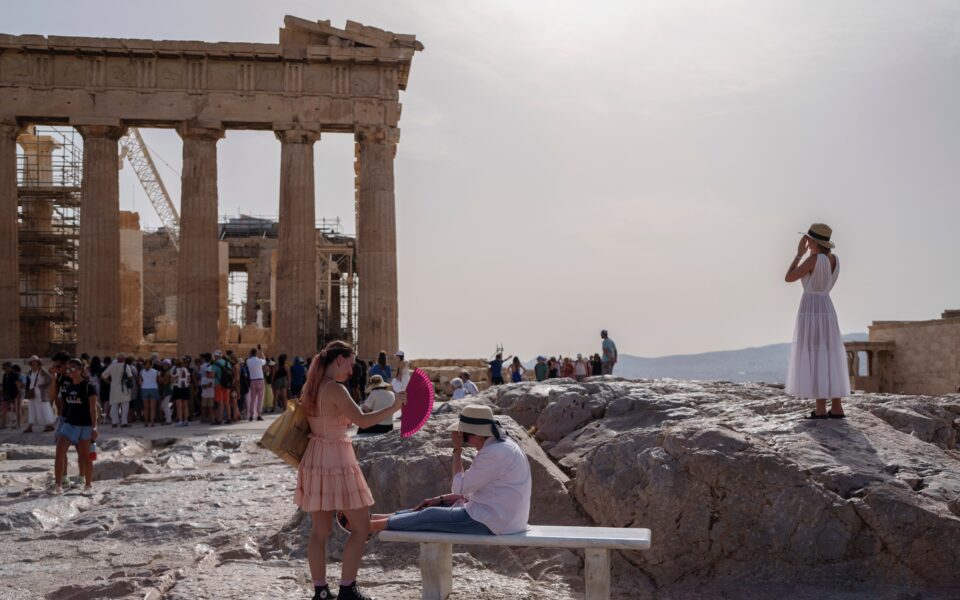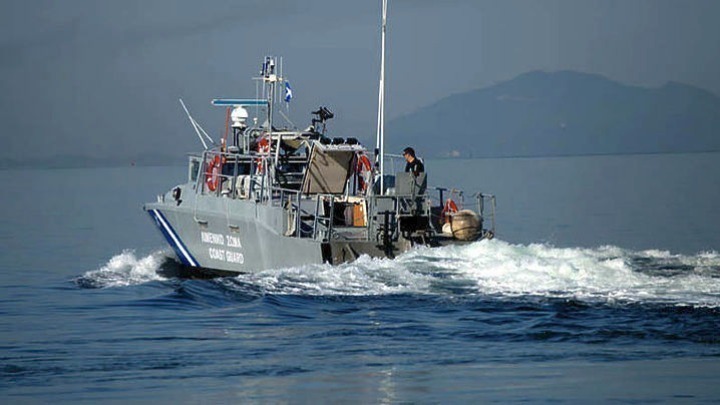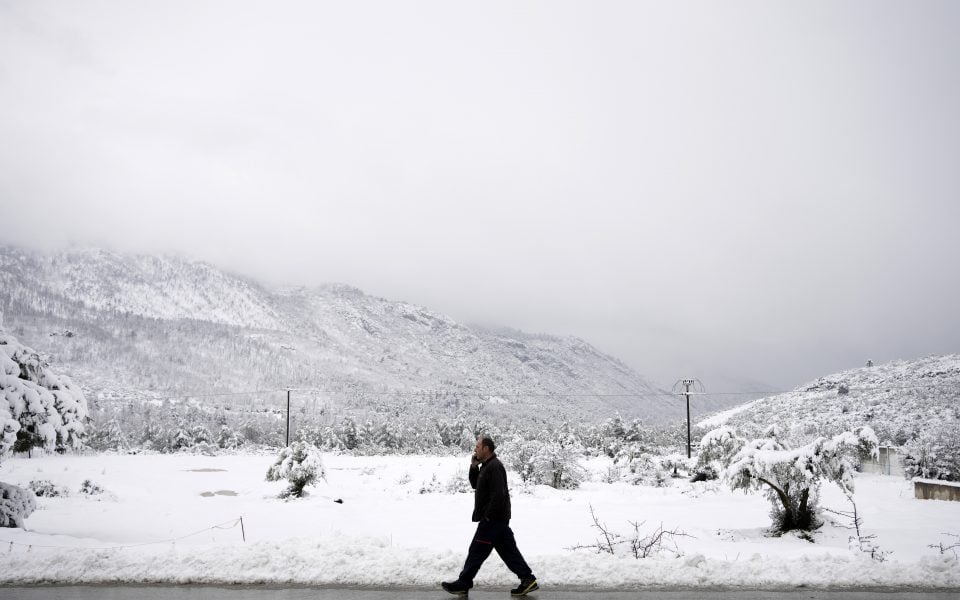‘It’s too hot,’ say tourists as season takes off


Recent deaths from exposure point to how effects of climate change are posing a new challenge for Greece’s biggest revenue generator
Dubbed by Newsweek “Greece’s Summer of Hell,” the tourist season is off to a precarious start. At least 10 tourists have gone missing or been found dead over the past weeks in Greece. The tragic string of deaths and disappearances comes as the country has also been inundated by heatwaves, with temperatures reaching 40 degrees Celsius in parts.
“It was definitely too hot,” one tourist who had just come from the Acropolis told us. “We walked around but could not stay long. We decided to take a taxi back [to the hotel]. [The heat] has gotten really bad.”
This weather follows last year’s rising temperatures that exacerbated devastating wildfires, erratic rain that caused catastrophic floods, and dust storms. “In the 20th century, we never had a heatwave before June 19. We had had several in the 21st century, but none before June 15,” said Panos Giannopoulos, chief meteorologist at the Greek National Meteorological Service. “This heatwave will go down in history.”
During peak heat periods, the authorities have implemented safety measures to minimize possible risks, including closing schools, limiting in-person work for civil servants and setting up air-conditioned spaces for the public.
‘We do it the Greek way, going to the beach after 4 p.m., sometimes even at 7 p.m. No real activities from noon to 4 p.m. except driving with the aircon on or having a coffee or lunch’
Along with record temperatures, the country is anticipating an unprecedented number of visitors. In 2024, 35 million tourists are expected to visit the country, a 7% increase from 2023. The severe heat has already had repercussions, with emergency services stationed in tourist areas, water bottles being handed out, and limiting access to archaeological sites during peak heat hours.
Regarding the individual tourist deaths that have led the news in several countries around the world, reports suggest that they, too, may be connected to the extreme weather conditions. Scientists, speaking to CNN, posit that heat may impair typical brain activity and aggravate pre-existing physiological conditions. While the bodies of the deceased are still pending examination to determine the exact causes of death, authorities continue to caution against strenuous activity under extreme weather conditions.
“There is a common pattern,” Petros Vassilakis, the police spokesman for the Southern Aegean, told Reuters, speaking about the fatalities. “They all went for a hike amid high temperatures.”
These heatwaves aren’t simply making visiting Greece uncomfortable or causing minor disruptions in tourist itineraries; recent headlines point to a crisis in the industry as it grapples with these conditions. If these heatwaves persist, as many experts believe, or worsen over time, the implications for the tourism industry will be significant, as Greece will become a destination unsuitable for those interested in active vacations.
To date this year, the tourism industry has already taken a hit, as archaeological sites and other attractions have had to close for parts of the day on a number of occasions. The inconvenience of having to reschedule site visits is just the tip of the problem here. As other news outlets have pointed out, tourists are no longer just navigating access to ancient ruins, they’re also charting their way through the hazards of modern-day climate change.
Public sentiment
Travel influencer Sophie, who goes by @tzatchickie and boasts over 120,000 followers on TikTok and Instagram, assuaged other travelers’ worries about the recent tragedies. “We are in the middle of the second heatwave in three weeks in Greece. It’s very warm… But if you are coming to Greece in the summer, don’t plan endless hikes or visits to archaeological sites. Wear your hat, take your sunscreen, and drink enough water.”
When speaking to Sophie about her experience traveling during the heatwave, she stated, “We’re traveling with our car, so it is actually not bad traveling during the day with [air conditioning] in the car and on the ship!” She continued: “We do it the Greek way, going to the beach after 4 p.m., sometimes even at 7 p.m. No real activities from noon to 4 p.m. except driving with the aircon on or having a coffee or lunch…”
“All the influencers that post about Greece shared their warnings about the heat. We all agree. Most people that comment also agree,” she said, regarding restrictions placed on archaeological sites and avoiding the hottest hours of the day. “During the first heatwave, we visited some sites like a castle and Ancient Olympia, but only after 5 p.m. It was still hot, but the castle was closed from 1-5 p.m. by government rule, which is great, as it should be.”
“Of course, there are always some people who have a different opinion or do things differently,” Sophie said in regard to tourists who might object to restrictions. “I’ve seen many people between noon and 2 p.m. cycling on mountain roads… In my opinion, that’s insane.”
Others have weighed in, sharing their travel experience during periods of extreme heat. Videos of sweaty tourists trying to beat the 40 Celsius heat popped up all over TikTok. “I walked around the Acropolis [during] the midday siesta; I got heatstroke,” commented one user. Another captioned a video of themselves in the heat: “Currently not breathing in the 40-degree heatwave in Greece.”
The weather has also taken its toll on tourism industry workers, too. “We have no choice; it’s the start of the tourist season,” said Elisavet Robou, a fast-food outlet owner, speaking to the Guardian. “We have air conditioning and fans, and staff are allowed to take breaks, but unfortunately, the climate crisis is here.”
Greeks and travelers familiar with Greece will tell you that high temperatures have always been part of a Greek summer, even if not at current levels. As one local put it: “Please don’t go for a hike in 35 to 40 degrees; it’s dangerous! In Greece, that’s the time for the beach, not for hiking or for walks!”
A tourism boom in Europe
Greece is not the only country facing adverse weather conditions this year. “Europe saw yet another year of increasing temperatures and intensifying climate extremes – including heat stress with record temperatures, wildfires, heatwaves, glacier ice loss, and a lack of snowfall,” said Elisabeth Hamdouch, the deputy head of unit for Copernicus at the EU’s executive Commission.
This summer is coming on the heels of increased opposition to rapidly growing tourism and its burden on local communities. We are currently seeing a post-pandemic surge in travel following the pent-up desires of the Covid period, with total tourist numbers expected to surpass 2019 levels, according to the UNWTO World Tourism Barometer. However, places like Venice, Barcelona and the Canary Islands are among a growing list of places asking for restrictions on tourism.
Between images of crowded canals in Venice, a long queue to summit Mount Everest, and a couple carving their names on the 2,000-year-old Colosseum amphitheater, there is no shortage of headlines that showcase why locals in tourism hotspots might be looking for relief.
There’s yet one more factor to consider: Beyond the direct strain on local populations, how we travel considerably impacts the environment. A recent report by the Travel Foundation, an independent organization that aims to create better, more equitable, climate-friendly tourism, points out that tourism already accounts for 8% to 11% of CO2 in direct and indirect emissions globally. If we continue at this pace, all emissions will rise steeply, with direct emissions alone increasing by 73% from 2019 to 2050.
“Travel is touted as a quasi-spiritual experience, and we internalize this idea that having visited as many places as you can makes you a fundamentally more interesting person and is a virtue, but that bucket list travel mindset is kind of the same thing as the more-is-more mindset of overconsumption in all areas of life,” said a user on TikTok.
While it’s one of many factors affecting the environment, how we travel is part of a cycle that has contributed to recent climate conditions. However, it is crucial to acknowledge that tourism is the bedrock of the Greek economy, comprising a third of Greece’s GDP. A study from the Institute of the Hellenic Tourism Business Association (INSETE) estimates that tourism contributes between €62.8 billion and €75.6 billion, corresponding to between 28.5% and 34.3% of GDP, in direct and secondary benefits. In light of this economic dependence, the problem requires a different solution than simply turning people away.
New direction for the industry
Recent conditions are putting pressure on the industry by making vacationing in Greece seem at best uncomfortable and at worst deadly. Ben Lynam, head of communications at the Travel Foundation, told the Economist, “There’s a reckoning within the industry now to be sure that we are not just paying lip service to issues that are really pressing down on the industry.”
Experts have proposed sustainable alternatives to the current way we travel to help both consumers and the industry mitigate the strain on locals and the environmental effects of tourism. Solutions include steering people away from flying to more environmentally friendly forms of transportation; limiting the number of visitors to certain sites or areas; and working with the industry to implement sustainability measures. Other tourists have opted to take “off-season” vacations in Greece during the fall or winter months, when the weather is more appropriate for strenuous outdoor activities.
As for the steps that summer visitors can take right now to enjoy themselves while mitigating risk, the travel influencer Sophie has some advice: “People have to understand July and August are not so much for sightseeing and hiking here – not for an active vacation, but for the beach and the pool. It has definitely become hotter; you just have to adjust your plans for it.”
Tatiana Geroulanou is a summer intern at Kathimerini English Edition. She is in her final year at Williams College, MA, where she is doing a BA in history and art history.
Source: ekathimerini.com




